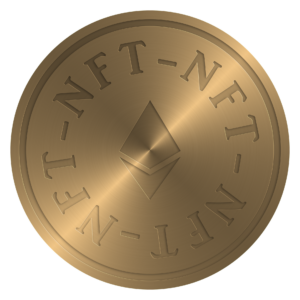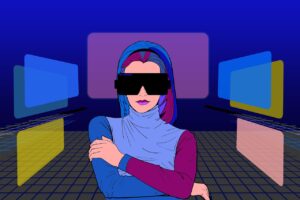 Non-Fungible Tokens (NFTs) have become an increasingly popular way for companies to promote their fashion products. Non-Fungible Tokens are a relatively new Blockchain-based technology that is changing the way people buy and sell digital assets. They can be used for authentication, anticounterfeiting, and to protect intellectual property rights. An NFT is a unique digital identifier that is recorded on a Blockchain so as to certify ownership and authenticity of the thing identified by the token. Because NFTs are each unique, they differ from cryptocurrencies which are fungible. Non-Fungible Tokens cannot be duplicated, switched, or divided-up. The ownership of an NFT is recorded in a Blockchain and can be transferred by the owner, allowing NFTs to be bought, sold, and traded. Non-Fungible Tokens can be created by anybody with access to a Blockchain ecosystem. Non-Fungible Tokens often include references to digital artworks, photos, videos, audio or fashion. An NFT may confer licensing rights to use a digital asset. Non-Fungible Tokens can be linked to physical items to improve verification of authenticity and provide traceability. They can also be used for marketing and customer loyalty programs.
Non-Fungible Tokens (NFTs) have become an increasingly popular way for companies to promote their fashion products. Non-Fungible Tokens are a relatively new Blockchain-based technology that is changing the way people buy and sell digital assets. They can be used for authentication, anticounterfeiting, and to protect intellectual property rights. An NFT is a unique digital identifier that is recorded on a Blockchain so as to certify ownership and authenticity of the thing identified by the token. Because NFTs are each unique, they differ from cryptocurrencies which are fungible. Non-Fungible Tokens cannot be duplicated, switched, or divided-up. The ownership of an NFT is recorded in a Blockchain and can be transferred by the owner, allowing NFTs to be bought, sold, and traded. Non-Fungible Tokens can be created by anybody with access to a Blockchain ecosystem. Non-Fungible Tokens often include references to digital artworks, photos, videos, audio or fashion. An NFT may confer licensing rights to use a digital asset. Non-Fungible Tokens can be linked to physical items to improve verification of authenticity and provide traceability. They can also be used for marketing and customer loyalty programs.
In fashion, LVMH (Louis Vuitton) and Nike were among the first brands to create NFTs to drive brand engagement and loyalty. These digital assets allow brands to build a virtual sneaker, or a 3D model of a handbag or other accessory. They can also be incorporated into video games or other digital mediums, i.e., a Metaverse, to drive virtual engagement with the product. Non-Fungible Tokens also provide a new channel for artists to showcase their work without having to rely on traditional copyright laws for protection. Artists can use NFTs to release their art as a digital item and have the freedom to sell it under their own terms.
A Metaverse is a virtual world, often on the net, that is essentially independent of our physical reality. It comprises multiple emerging technologies that promise the next level of interaction in the virtual and physical worlds. A multi-billion dollar industry, the Metaverse is a virtual environment that includes a digital economy. It’s a decentralized ecosystem that is supported by cryptocurrencies and NFTs. Companies and brands are making an effort to leverage the Metaverse as an innovative platform for marketing and sales. Many have already launched NFT-based products, including clothing. The fashion industry has jumped on the Metaverse bandwagon to promote its brands and products to younger consumers. Some of the biggest names in the industry have partnered with popular NFT platforms to drive their branded content. Fashion houses and labels are using NFT’s to promote their brand in virtual fashion shows. These shows allow users to try on virtual clothing in an augmented reality setting. These virtual fashion shows also serve as a platform to engage with buyers and generate interest in the brand. Moreover, it can be a great way to reach Gen-Z and Gen Alpha customers who are less likely to shop offline.
promise the next level of interaction in the virtual and physical worlds. A multi-billion dollar industry, the Metaverse is a virtual environment that includes a digital economy. It’s a decentralized ecosystem that is supported by cryptocurrencies and NFTs. Companies and brands are making an effort to leverage the Metaverse as an innovative platform for marketing and sales. Many have already launched NFT-based products, including clothing. The fashion industry has jumped on the Metaverse bandwagon to promote its brands and products to younger consumers. Some of the biggest names in the industry have partnered with popular NFT platforms to drive their branded content. Fashion houses and labels are using NFT’s to promote their brand in virtual fashion shows. These shows allow users to try on virtual clothing in an augmented reality setting. These virtual fashion shows also serve as a platform to engage with buyers and generate interest in the brand. Moreover, it can be a great way to reach Gen-Z and Gen Alpha customers who are less likely to shop offline.
In another example, Adidas and its BAYC clothing line have teamed up with NFT-based content creators to release limited edition NFT profile pictures and other Metaverse content in a variety of ways. Metaverse platform Decentraland hosted its first Metaverse Fashion Week in March of 2023. Thousands of visitors were able to virtually experience dozens of global brands at virtual fashion shows, live music sessions at branded after parties, and buy and wear digital clothing directly from catwalk avatars. There were many showrooms, stores, conversations and events. Hugo (rebranded Hugo Boss), signed with MVFW partner Boson Protocol to enable visitors to buy physical Hugo goods within the Metaverse, including during Metaverse Fashion Week, making it one of the first brands to participate.
Another interesting use of NFT’s in fashion is a mix of virtual reality (VR) and augmented reality (AR) technology called mixed reality (MR). This technology ![]() allows users to try on different clothes through their digital avatar, without having to leave their homes or change into a new outfit. MR also provides precise sizing recommendations to help people find their ideal fit. Some of these virtual clothes are sold in the form of NFTs, which can be traded or redeemed for real-world clothes. This strategy can be a lucrative one, since NFTs are relatively inexpensive to buy and can appreciate in value over time.
allows users to try on different clothes through their digital avatar, without having to leave their homes or change into a new outfit. MR also provides precise sizing recommendations to help people find their ideal fit. Some of these virtual clothes are sold in the form of NFTs, which can be traded or redeemed for real-world clothes. This strategy can be a lucrative one, since NFTs are relatively inexpensive to buy and can appreciate in value over time.
